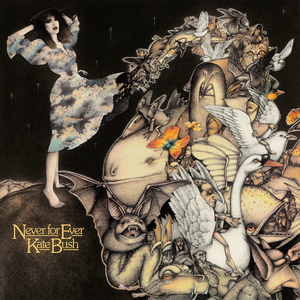Published on Aug 18, 2022
Never For Ever was, in many ways, a coming of age for Kate Bush.
It was the first album where she got her hands on the producer’s desk (hands which have never yet let it go). It was her first #1 album (and, indeed, the first ever British #1 by a solo female artist). It was her first album to feature digital synthesizers and drum machines. It was the first album where she had to mourn one of her own (“Blow Away (For Bill)” is a tribute to a lighting technician who died in a fall during one of her few concert tours).
And it begins the process of the ingenue turning into a woman of grace and skill, a sorceress of lyrics and music.
Released after the relative failure of Lionheart, there may have been less pressure on Bush to match up with the smashing success of “Wuthering Heights.” She responded with a album that spawned one British top ten and two other top 20 hits and whose gems are a bit easier for the casual listener to gather up. While it might seem a little far-fetched to call a Kate Bush album accessible, this is the first one that comes close.
For once, I’ll start with the negative and get it out of the way. There are moments on Never that sound dated, precisely because there are (early) digital synthesizers used on it. The synthesized whistling on “All We Ever Look For” and the Shadowfax-on-downers outro on “Egypt” could be disposed of without me missing them in the least. (That’s the band, not the horse, if you’re confused.) Finally, Kate’s vocals on “The Wedding List” seem forced, which is too bad; the song itself is a funny, bitter retelling of Francois Truffaut’s The Bride Wore Black.
None of these are major issues, which is a good thing; if Never has a fatal flaw, it’s that there’s nothing on the album that is a huge win, either. “Violin” is Kate rocking it, and it’s good but not great. “Babooshka” is Kate taking on “The Pina Colada Song” and doing it one better. (And there’s Yet Another Sentence I never thought I’d write.) “The Infant Kiss” is an interesting version of Henry James’ Turn Of The Screw. The best songs by far are the curious waltz “Army Dreamers,” whose light tone belies a brutally sad story of a young man who joins the Army for lack of any other options and dies in a simple accident, and “Breathing,” a song about an unborn child and its knowledge that it is being exposed to nuclear fallout. Heavy stuff, but handled delicately and to perfection.
“Never For Ever” is the girl becoming the woman; while there are missteps, it’s definitely worth a listen.
